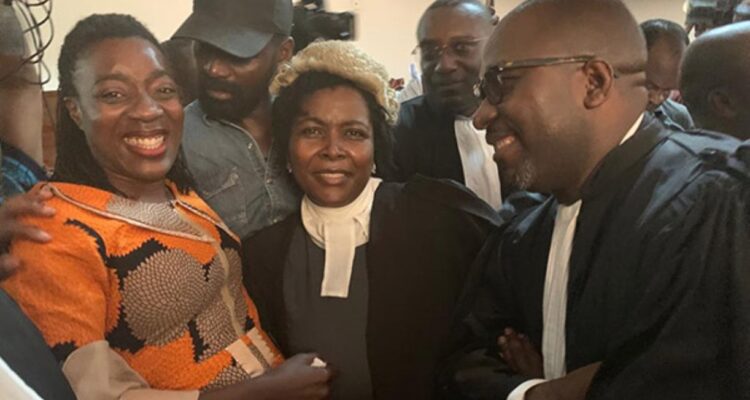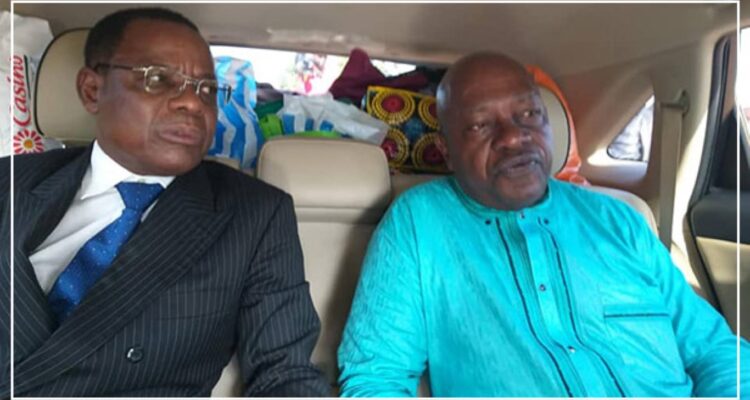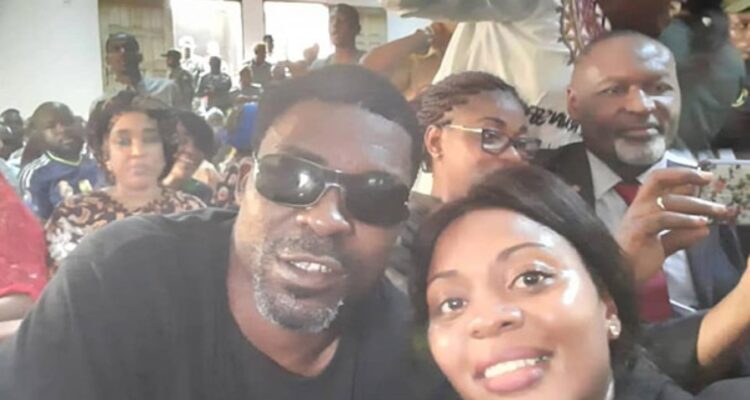1 – Just as the ruling power has announced “the discontinuation of pending prosecutions before the Military Courts, against some leaders and militants of political parties and in particular the Cameroon Renaissance Movement CRM), our first thought goes to our allies, comrades and sympathisers who have suffered the worst treatment with serious attacks on their dignity, were savagely tortured after being arbitrarily arrested and illegally imprisoned, some for more than 8 months. We are particularly thinking of our friend, our brother in arms, the 1st Vice-President Mamadou YAKOUBA MOTA. We are thinking of the other comrades who were shot on January 26th, 2019, those who were also tortured as a result of the uprising at Yaoundé Central Prison, including Mr NANA Serges Branco, of women of all ages, so heroic, in short, of all the comrades and sympathisers for the extraordinary resistance they have shown during all this time. We tell them our admiration and all our affection. We would like to express to them our admiration and all our affection. May they know that their sacrifice will not have been in vain and that, thanks to their struggle and their resistance, our compatriots have now taken full measure of what is at stake in our country.
We would like to express our heartfelt thanks to our Cameroonian and foreign lawyers who, in an exceptional commitment, have brilliantly defended us; to our loving, so dedicated families; to the Directorate, the leaders at all levels and the militants of our party for their ongoing vigilance and mobilisation; to the many Cameroonians of all sides of the spectrum, from the inside and the outside, for their commitment, their sympathy and their multifarious support which allowed us to remain standing during all this time. In this, they showed their desire for change and their faith in the platform that we proposed to the Cameroonian people. Let them know that the peaceful political struggle is just beginning, and that we are counting on them to prepare for the victories of tomorrow.
To the distinguished colleagues and foreign friends of Professor Maurice KAMTO, to the various learned societies of which he is a member, to the scientific community of lawyers, to his Peers of the foreign bars, to the many friends and sympathisers in foreign countries, we hereby testify our heartfelt gratitude for their extraordinary mobilisation and great affection.
Our heartfelt gratitude finally goes to the international community, the friendly countries of Cameroon, human rights NGOs and other organisations of civil society, to certain political parties, for their various statements in favour of a concerted and inclusive settlement of the multiform crises that are shaking our country, as well as our immediate and unconditional release.
The announced discontinuance of proceedings does not seem to have settled the situation of all our detained comrades. Not all were prosecuted before the Military Courts. Some are prosecuted in civil courts where a number of them have already been sentenced to long prison terms. If the charges against them have not been dropped and the convictions against the others overturned, none of us will be free and the struggle will continue until they are released. Our struggle aims at the emancipation of all the Cameroonian populations. That is why this struggle is profoundly right and appeals to the vast majority of our compatriots.
2 – The discontinuance of proceedings against some leaders of the CRM, the leaders of allied parties and organisations and our militants and sympathisers creates the conditions for discussions on the political aspect of the multifaceted crises that affect our country, provided that the ruling power does not lock itself in its usual indifference.
In this respect, it must be said that, if by this discontinuance of proceedings made under articles 13 and 14 of the Military Justice Code, of which paragraph 3 of the latter article leaves the possibility to resume the proceedings at any time, the current regime wants to hover a sword of Damocles on our heads and silence the claims that led to our arbitrary arrest and illegal detention, it would be a mistake. The political crisis that arose following the 7th October 2018 presidential election remains unresolved. It is about:
– the urgency of settling the issues of that election;
– the urgency of a consensual reform of the electoral system, in order to avoid further post-election crises in the future. This consensual reform must take place before any new election, as requested by almost all national political actors (including ELECAM), the international community, and which is certainly consistent with common sense;
– the guarantee of public freedoms and fundamental human rights. We will never accommodate the fact that a Sub-Divisional Officer can decide by himself, through a regulatory act that is the lowest in the hierarchy of legal norms in Cameroon, to destroy the rights and freedoms guaranteed by the Constitution and the international legal instruments to which Cameroon is a party, including the Freedom of assembly and peaceful demonstrations;
– the guarantee of the independence of justice and the renunciation of the instrumentalization of justice for political ends.
In this respect, the proposals made by Sultan MBOMBO NJOYA appear to us to be wise and common sense because they make it possible to lay the ground for a new Republic with a better sustained democratic foundation.
In this context, we cannot avoid an appropriate response to the question of tribalism that the power has, oddly enough, never condemned.
3 – The Major National Dialogue (MND) has just ended. It was supposed to provide a key solution to the crisis that has been shaking the NOSO regions for three years.
The participants in this Dialogue chose as a response to the Anglophones’ demands on the form of the State, to maintain decentralisation with a “special status” for the regions concerned.
Our greatest wish is that this solution really meets the expectations of the populations of these regions. But it is feared that this will not be the case, for the following reasons:
a) In 2017, we proposed regionalism with a special status for the English-speaking regions. But it was before the exacerbation of the armed conflict with its 3,000 deaths and the many refugees and internally displaced. Since then, the NOSO armed groups seem to have strengthened their grip in the two regions, have become better organised, and in general they seem to be finding this solution proposed by the MND far from their expectations.
b) To make this solution acceptable if not for all Anglophones, at least for the largest number, it would have been necessary to discuss the content of the “special status” within the framework of the MND with the representatives of the various groups concerned, including the secessionists, because for the moment, they are sold a package with unknown contents.
(c) Moreover, the possibility of a special status is already contained in Article 62 (2) of the Constitution of January 18th, 1996, which provides that, without prejudice to the general system applicable to all regions, “the law may take into consideration the specificities of certain Regions with regard to their organisation and functioning.”
In short, on this fundamental question of the form of the State, the current regime has stood firm on its longstanding position. Did we really need about 3,000 deaths, more than a million internally displaced persons, nearly 40,000 refugees, hundreds of villages destroyed, three years of lost schooling and an economic catastrophe to come and reaffirm a Constitution that has been denied for 23 years?
d) There are no shortcuts to a direct dialogue with the Anglophone leaders who have a real grip on the armed groups controlling most of the NOSO. In this respect, it seems to us illusory to believe that we can win peace by freeing some combatants and keeping in prison their leaders sentenced to life; to believe that the people and the combatants will give up their plight to those leaders who guided them and forced the regime to pretend to dialogue.
In this perspective, a general amnesty for all the leaders and all others arrested in the context of the Anglophone crisis is essential to create the conditions for a deep and lasting settlement of this crisis.
It is imperative if not to find a definitive solution to this crisis, at least to create a climate of peace in the two regions concerned before the next elections, through the adoption and implementation of de-escalation and confidence measures. Because, if the upcoming elections could not be held in the English-speaking regions, as in the 2018 presidential election, because of insecurity, holding them in the French-speaking regions would amount to de facto marking the partition of the country.
4 – As a general conclusion, the following observations could be made:
– By targeting only the Military Courts, the communiqué announcing the discontinuance of the proceedings against some leaders of political parties, in particular the CRM, seems not to cover the proceedings pending before the civil courts against a number of people concerned by the communiqué.
– The MND does not seem to have brought a new and lasting solution to the claims of Anglophones on the form of the State. Such a solution can only be reached through direct discussions with the political representatives of the armed groups that control the ground, including those who have recently been sentenced to life imprisonment.
– Such a solution is essential before the organisation of the next elections, so as not to open the way to a de facto partition of the country, because it cannot organise a credible election in the NOSO regions because of insecurity. In this perspective, it is urgent to release all those still detained because of their involvement in the Anglophone crisis.
– Our offer of April 2019 to definitively settle the issues of the 7th October 2018 presidential election was only met with insults and contempt. Hopefully, our offer will be taken up. The MND did not at all address the thorny issue of the post-election crisis. Even our 9 months of arbitrary imprisonment will not have been enough to sensitize the ruling power on the need to resolve this issue. In particular, no attention has been paid to the crucial issue of the consensual reform of the electoral system before any new election, an issue on which all political actors in our country, including ELECAM, agree. It is therefore clear that the ELECTORAL HOLD-UP continues and intends to be reinforced. We are therefore obliged to maintain and accentuate the National Resistance, in the forms and methods that will be communicated later. As a result, we urge CRM activists and supporters, as well as all Cameroonians concerned about the future of our country, to remain mobilised.
Yaoundé, October 5th, 2019
The President-elect,
National President of the CRM
Maurice KAMTO.



